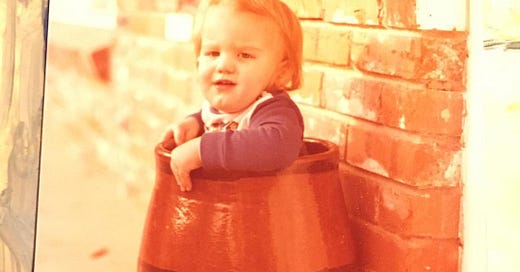My Life from Solid to Vapor, From the Beginning
Going back, and going deep, to recover the consciousness at the Source
I’ve always had, even (maybe especially) at a young age, the ability to know when people aren’t quite being authentic. I don’t just know it in my brain, like that one plus one equals two, but I can feel it. Before I really had an awareness of it or at least a sense of how to understand it, I think it just made me somewhat cynical about people in general. I was born separate—very separate. An only child with a tragic story attached to me at the tender age of three. My earliest memories involve David, directly and indirectly. They involve walking with him, jumping around him on a trampoline, and riding in a car with him at the wheel…just the two of us, just quick flashes of memory that somehow, miraculously got preserved in the recesses of my maturing brain. But the memories also involve hearing his name, people talking about him, sometimes to me, but often to others as a way of explaining who I was. “This is David’s daughter.” She’s the daughter of the one who is dead. Oh…. And the looks. Sympathy. Discomfort. No words, just staring at me as if I’m already a sad story. Suicide. That was the story. I remember someone being surprised at my lack of anger at David or at people who commit suicide in general. “If it was me, I’d be angry.” Angry at who? At him? I was incomprehensibly (to this person) so rational about it. Well, why not? It happened when I was three, and I was a lonely kid, often alone, with plenty of time and space to rationalize (and irrationalize) things. There was plenty of stuff swirling around in my head to mess me up, but about David’s suicide, I always had confidence: It was not about me. I could feel him too. I felt him around me. In my dreams, I even met him, befriended him, and did mundane things with him like play chess. We didn’t talk much in the dreams. We didn’t have to. There was no anger there. Only kindness…and love. It was love without reason. Love without a reason. Love that did not need saying because you already knew it.
The hardest thing about it, even more painful than the thing itself, was not knowing how to express my feelings about it. It wasn’t that there was no space for it. There were opportunities, plenty of child psychologists, and I had a mother who would have moved heaven and earth to let me express myself anyway I wanted to. The difficulty was inside me. It took me a long time (years, decades) to develop the skill set of self-expression. I struggled as a kid to learn how to be around people and answer questions and have socially appropriate conversations. Around strangers, I did not speak at all. It could take me several encounters to muster the courage to speak. The next door neighbors and their daughter Grace were very patient.
{Note to the reader before you proceed: This writing is along the same lines as my article, “New Adulting,” although I have imposed a paywall from this point. My reason is best articulated in the words of Anne Elliot in Persuasion, by Jane Austen: “My idea of good company, Mr. Elliot, is the company of clever, well-informed people, who have a great deal of conversation; this is what I call good company.” (Also, Anne’s idea of good company involves people who achieve cleverness by reading and listening, and showing interest in others. Real interest.) Mr. Elliot replies to his cousin Anne: “You are mistaken, that is not good company. That is the best.” The rest of this article, therefore, is for you who are in the very best class of company.}
Keep reading with a 7-day free trial
Subscribe to Heavy Crown Press to keep reading this post and get 7 days of free access to the full post archives.



